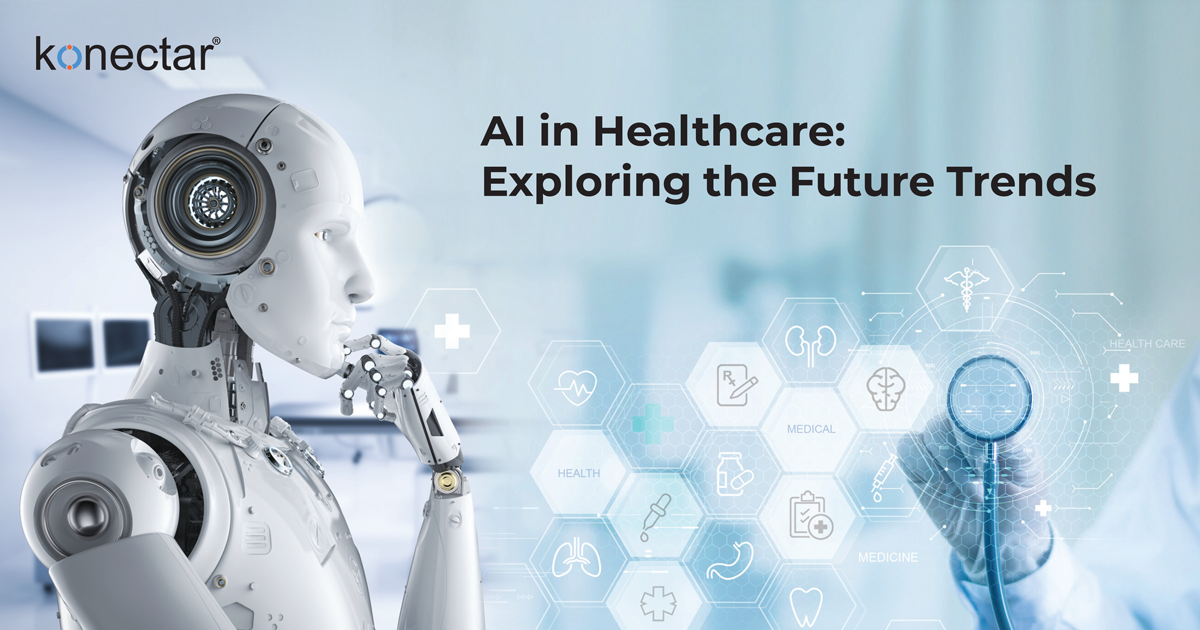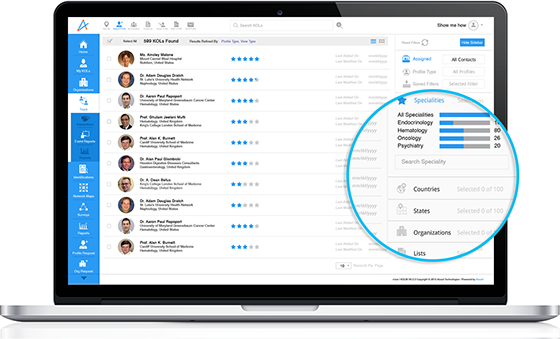28 Nov 2023
AI in Healthcare: Exploring the Future Trends

AI in healthcare is offering innovative solutions to longstanding challenges. It is ushering in a new era of patient care, diagnosis, and treatment. From advanced diagnostic tools to personalized treatment plans, AI Technology is poised to reshape the way we perceive and access medical services, ultimately enhancing our well-being. In this article, we will explore how this technology will reshape the course of different aspects of healthcare.
In this article:
The Rise of Artificial Intelligence
AI's foray into healthcare began with the digitization of medical records and the development of expert systems that could assist in diagnostic processes. These early AI applications, while rudimentary by today's standards, laid the foundation for what was to come. The combination of advanced algorithms, increased computing power, and the availability of vast Healthcare Data opened up new horizons.
Fast forward to today, and AI has become a game-changer in healthcare. Its impact is felt across various medical domains, from diagnostics and treatment recommendations to drug discovery, patient care, and administrative tasks. Systems powered by AI can analyze medical images, such as X-rays and MRIs, with unparalleled accuracy. They can also predict disease outbreaks, optimize hospital resource allocation, and even assist in surgery.
The increasing prevalence of wearable devices and the Internet of Things (IoT) has helped healthcare professionals to effectively monitor healthcare remotely. As for patients, these have empowered them to take charge of their health. The Impact of AI in Healthcare is not confined to the clinical domain alone. It extends to healthcare administration, helping reduce administrative burdens, streamline operations, and improve patient experiences. This, in turn, allows medical professionals to focus more on patient care, ultimately enhancing the quality of healthcare services.
Potential Applications of AI in Healthcare
-
Enhanced Diagnostics
AI's role in diagnostics is one of its most significant contributions to the healthcare field. Machine learning algorithms powered by AI can analyze medical images, including X-rays, MRIs, and CT scans, with precision that surpasses human capabilities.
Machine learning algorithms can process vast datasets of medical images and detect even subtle abnormalities or irregularities that might be challenging for human radiologists to identify. They work tirelessly, without fatigue, ensuring consistent and accurate results.
AI algorithms excel at identifying diseases and conditions in their early stages. Early detection is a game-changer in healthcare, as many medical conditions become treatable and manageable when caught at an early phase. AI's ability to spot these conditions early can lead to more effective treatments and, in many cases, save lives.
AI algorithms are also lightning-fast in processing and analyzing medical images. This speed can drastically reduce the time patients need to wait for their test results, allowing for quicker diagnoses. In cases where immediate action is required, such as a stroke or severe trauma, AI's speed can be a lifesaver.
AI can help improve Diagnostic Accuracy and reduce the need for additional tests or procedures, which in turn can help lower healthcare costs. But that doesn't mean AI will replace radiologists, in fact it will assist them to enhance their diagnostic capabilities. They can also provide valuable data-driven insights to Healthcare Professionals. By analyzing patterns in medical imaging data, they can identify risk factors and treatment responses that might not be apparent through traditional methods.
-
Predictive Analytics
Predictive analytics in healthcare, driven by AI, revolutionizes how healthcare providers plan, allocate resources, and deliver care. AI can analyze vast datasets from various sources, including social media, online searches, and patient records, to detect early signs of disease outbreaks. By identifying patterns, AI can provide timely warnings, helping healthcare authorities prepare for and mitigate potential epidemics. This early detection is crucial for managing public health crises, such as the COVID-19 pandemic.
AI-driven predictive analytics can assess an individual's health status and risk factors. By analyzing a patient's medical history, lifestyle, and genetic predispositions, AI can predict health trajectories and identify potential health risks. Healthcare providers can intervene early, offering personalized preventive measures or treatments to keep patients healthier and reduce healthcare costs in the long run.
Hospitals and healthcare systems can benefit from predictive analytics to optimize resource allocation. By analyzing historical data and real-time patient information, AI can predict patient admissions, helping hospitals allocate beds, staff, and other resources efficiently. This proactive approach minimizes overcrowding, reduces wait times, and ensures better Patient Care.
AI can predict medication adherence and potential medication-related problems for patients. By analyzing patient data, including prescription history, AI can alert healthcare providers to issues like missed doses or drug interactions, allowing them to intervene and adjust treatment plans as needed.
AI-powered predictive analytics can help manage chronic diseases such as diabetes or hypertension. By continuously monitoring patient data, AI can detect early signs of disease exacerbation and alert healthcare providers and patients. This proactive approach can reduce hospital admissions and complications related to chronic conditions.
-
Personalized Treatment Plans
AI can help analyze a patient's genetic data to identify specific genetic markers that may influence their treatment response. This information allows healthcare providers to prescribe medications or therapies more likely to be effective for the individual. For example, in cancer treatment, AI can help identify targeted therapies that work best based on the patient's genetic profile.
It can continuously monitor a patient's health, adjusting treatment plans. For instance, in diabetes management, AI can analyze real-time glucose levels and recommend insulin doses accordingly, leading to better blood sugar control.
-
Drug discovery and development
Pharmaceutical companies generate vast amounts of data including chemical compounds, biological assays, and clinical trial results. AI can analyze this data, uncovering patterns and relationships that humans might miss. This accelerates the identification of promising drug candidates.
AI is capable of virtually screening millions of chemical compounds to predict their potential as drug candidates. This process, which typically takes years in traditional drug discovery, is significantly expedited, saving time and costs.
AI can identify existing drugs that may be repurposed for new therapeutic uses. This approach is cost-effective and can bring treatments to patients faster. For example, during the COVID-19 pandemic, AI helped identify existing drugs with potential efficacy against the virus, expediting treatment options.
It can optimize Clinical Trial design by identifying the most suitable patient populations, improving trial protocols, and predicting patient outcomes. This precision in trial design can increase the chances of successful trials and expedite regulatory approvals. As technology advances, we can anticipate more groundbreaking developments, further improving patient outcomes and healthcare efficiency.
FAQs
-
What role does AI has in diagnostics, and how does it impact healthcare?
AI plays a significant role in diagnostics by enhancing the accuracy and speed of medical image analysis. Machine learning algorithms can process medical images like X-rays and MRIs with high precision, helping identify diseases and conditions in their early stages. This not only improves patient outcomes but also lowers healthcare costs.
-
How does AI assist healthcare professionals in diagnostics, and does it replace radiologists?
AI doesn't replace radiologists; it assists them. AI serves as a valuable second opinion, highlighting potential areas of concern in medical images. This allows radiologists to confirm diagnoses and plan treatments more effectively.
-
What are the applications of predictive analytics in healthcare driven by AI?
Predictive analytics powered by AI is used to forecast disease outbreaks, predict patient admissions, assess individual health risks, and optimize hospital resource allocation. It helps healthcare providers offer proactive care and personalized preventive measures.
-
How does AI contribute to drug discovery and development in the pharmaceutical industry?
AI accelerates drug discovery by analyzing vast datasets to identify potential drug candidates. It can virtually screen millions of chemical compounds, repurpose existing drugs, and optimize clinical trial design. This expedites the development of new treatments and reduces costs.
The Herald of a New Era
The journey of Artificial Intelligence in healthcare is an awe-inspiring saga of innovation and human perseverance. With the vast terrain of challenges and opportunities that lie ahead, AI's ascent in healthcare remains a beacon of hope for a healthier and more accessible future.
If you are looking to gain some brilliant insights into clinical trial impact analysis, publication impact analysis, medical conference analytics and more, seek konectar’s professional services.






